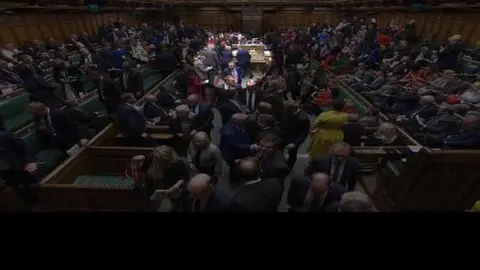PMQ: Workers will pay for energy firm profits, Starmer tells Liz Truss
Sir Keir Starmer has told Liz Truss working people will be footing the bill for "vast" energy firm profits under her plans to tackle the energy crisis.
At her first Prime Minister's Questions, Ms Truss rejected Labour's call to extend a windfall tax on gas and oil company profits.
Ms Truss also used her first full day as PM to appoint more ministers.
Meanwhile, an online meeting between the Queen and senior politicians has been postponed.
Buckingham Palace said the Queen had been advised to rest after "a full day" on Tuesday during which she met the outgoing prime minister Boris Johnson and his successor Ms Truss.
Under a plan, to be outlined by Ms Truss in the Commons on Thursday, the typical energy bill could be capped at about £2,500.
The full details have yet to be revealed but the overall package is likely to total around £100bn.
This will be paid for, in the short-term, by higher government borrowing, according to the new Chancellor Kwasi Kwarteng, who had a meeting with bankers and other financial figures on Wednesday morning.
At PMQs, Sir Keir told Ms Truss "energy producers will make £170bn in excess profits over the next two years".
"Is she really telling us that she is going to leave these vast excess profits on the table and make working people foot the bill for decades to come?" the Labour leader asked.
Ms Truss said she understood people were "struggling with the cost of living" and energy bills, which is why she would take "immediate action to help people with the cost of their energy bills".

A very different feel to PMQs

As Prime Minister's Questions finished, there appeared to be a warm, one-on-one brief chat between Liz Truss and Sir Keir Starmer.
I think Sir Keir said "well done" to his opponent. All party leaders regularly acknowledge that PMQs is a tough gig.
So how did it feel, and how did the main players perform?
It felt less personal, much less theatrical and more ideological.
Gone were the linguistic gymnastics of Boris Johnson, and the personal venom between the Conservative and Labour leaders.
Judging either by this first outing is clearly ridiculous, it will take a while for both leaders to adjust to this new normal on a Wednesday lunchtime.
But what is clear already is how different it will feel and the extent to which that will demand a very different approach from Sir Keir than the one he adopted with Boris Johnson.

 HoC
HoCThe prime minister said she would reform the UK's overall energy mix by building more nuclear power stations and exploring more fossil fuel supplies in the North Sea.
She argued extending the windfall tax on oil and gas companies would deter investment in the UK "just when we need to be growing the economy".
Turning to Ms Truss's plan to halt planned tax rises on big business, Sir Keir accused her of "protecting the profits of Shell and giving Amazon a tax break rather than helping families and public services".
Ms Truss said she was "on the side of people who work hard and do the right thing" and her plans would deliver new investment and new jobs "right across our country".
The Labour leader accused her of being part of a government that "got us into this mess and now says how terrible it is".
"Can't she see there's nothing new about a Tory prime minister who, when asked who pays, says 'it's you, the working people of Britain'?"
To cheers from Tory MPs, Ms Truss replied: "There's nothing new about a Labour leader who is calling for more tax rises. It's the same old, same old tax and spend."
The SNP's leader at Westminster, Ian Blackford joined Sir Keir's attacks, describing "a Truss tax, that household and businesses will be paying for years to come".
Downing Street later said the existing windfall tax - the Energy Profits Levy put in place by former Chancellor Rishi Sunak in May - would not be altered. The levy is an additional 25% tax on UK oil and gas profits and is due to last until the end of 2025.
Ms Truss discussed the problem of rising energy bills in a phone call with German Chancellor Olaf Scholz.
No 10 said the two leaders discussed the importance of "protecting countries made vulnerable by Russia's economic blackmail", and the Northern Ireland Protocol.
Following PMQs, Ms Truss announced further appointments to her government, including some junior jobs for Sunak-supporting MPs such as Robert Jenrick who becomes a health minister.
Former Brexit minister Steve Baker also makes a return to government, becoming a minister in the Northern Ireland Office.
